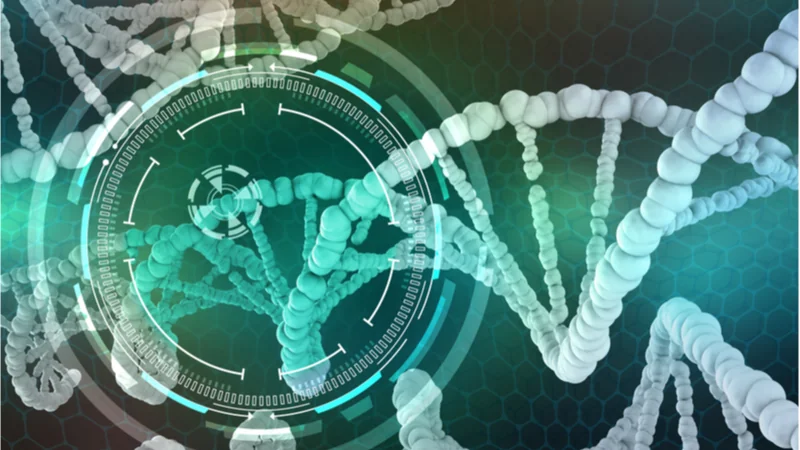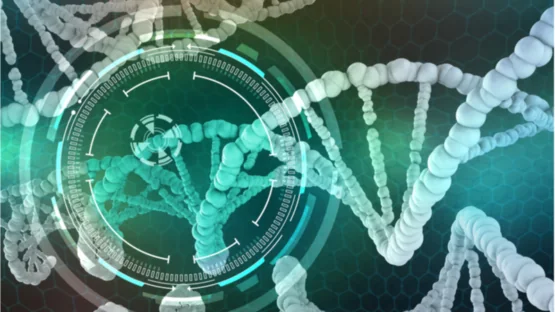A research paper published in Nature Medicine has shown the results of a broad investigation into gene variants associated with healthspan [1].
Genome-wide association studies
A genome-wide association study is an effort to use enormous databases and computational analysis to examine the genetic causes of disease [2]. Previous studies have evaluated the effects of genes on individual and multiple diseases [3,4] along with effects on lifespan [5]. This novel study builds upon that work with a focus on disability-adjusted life years (DALYs). This metric measures healthspan rather than lifespan, and it has used as part of the Global Burden of Disease Study to ascertain the impact of various diseases [6].
While previous studies have used this work to evaluate environmental and modifiable risk factors around the world, this research combines that study’s results with results from two biobank studies in order to measure the impact that genetic variations have on 80 of these diseases, thus measuring how much impact they have on DALYs.
The relationship of genetics and disease
This study derived its data from FinnGen’s database of 309,136 people and UK Biobank’s database of 426,612 people. Running this data through an algorithm that matched alleles to diseases, the researchers were able to identify 3,123 gene-disease relationships with very low P values. They then mathematically determined how many healthy years would have theoretically been preserved if those alleles would have been lower-risk alleles instead. The vast majority of the studied alleles had minimal effects; most of them were shown to be associated with less than a quarter of a DALY.
Some of the common mutations were associated with multiple problems, such as a lung-related gene that took away three months of healthspan on average by increasing the risks of lung cancer, COPD, and a handful of other diseases. One common mutation took away an average of half a year’s worth of healthspan through prostate cancer risk. Another common mutation of a heart gene took away an average of a healthy year through a substantially increased risk of ischemic heart disease. The infamous APOE4 allele, a well-known risk factor for Alzheimer’s disease, was found to take away an average of two healthy years through dementia and another half a year through heart disease.
Rarer variants were found to cause even more dramatic effects. While the margins of error were very high, one heart-related allele was found to take away, on average, roughly a dozen years of lifespan if it resulted in a loss of function; other pathogenic variants were found to take away approximately three years on average. Genes related to breast cancer, myocarditis, and colorectal cancers also appear to take away an average of five healthy years each.
There were also sex-specific differences. The allele that gave men a greater risk of prostate cancer was found to be associated with slightly longer healthspans in women. The allele that took an average of a healthy year due to heart disease took half a year from women and a year and a half from men. On the other hand, women were found to be more strongly affected by alleles related to Alzheimer’s disease.
Polygenic attributes
Some effects were found to be associated with multiple allele sets. Some of these sets were associated with three years of reduced lifespan, mostly attributable to heart disease. Other alleles were associated with decreased healthspan through chronic pain, largely in the lower back; this set was also associated with an increased risk of substance use disorders. Yet another set was found to be associated with three years of reduced healthspan through the intermediate risk factor of lower educational achievement.
Conclusion
These results are entirely statistical in nature and describe the effects of gene alleles in the aggregate, not how they influence any specific person. Someone who is at a genetically increased risk for ischemic heart disease is not necessarily going to get ischemic heart disease, particularly if that person is aware of the increased risk and takes steps to prevent it. A person whose alleles are associated with an increased susceptibility to substance use disorders can certainly prevent that from happening.
This highlights a potential for effective personalized medicine and perhaps gene therapy. While some mutations may have beneficial effects earlier in life (antagonistic pleiotropy), an older person with alleles that are statistically associated with shorter healthspans has every incentive to alter them. Further research will need to be conducted to determine if this can become an effective therapeutic strategy in the clinic.
Literature
[1] Jukarainen, S., Kiiskinen, T., Kuitunen, S., Havulinna, A. S., Karjalainen, J., Cordioli, M., … & Ganna, A. (2022). Genetic risk factors have a substantial impact on healthy life years. Nature medicine, 28(9), 1893-1901.[2] Visscher, P. M., Wray, N. R., Zhang, Q., Sklar, P., McCarthy, M. I., Brown, M. A., & Yang, J. (2017). 10 years of GWAS discovery: biology, function, and translation. The American Journal of Human Genetics, 101(1), 5-22.
[3] Mars, N., Widén, E., Kerminen, S., Meretoja, T., Pirinen, M., della Briotta Parolo, P., … & Ripatti, S. (2020). The role of polygenic risk and susceptibility genes in breast cancer over the course of life. Nature communications, 11(1), 1-9.
[4] Mars, N., Koskela, J. T., Ripatti, P., Kiiskinen, T. T., Havulinna, A. S., Lindbohm, J. V., … & Ripatti, S. (2020). Polygenic and clinical risk scores and their impact on age at onset and prediction of cardiometabolic diseases and common cancers. Nature medicine, 26(4), 549-557.
[5] Sakaue, S., Kanai, M., Karjalainen, J., Akiyama, M., Kurki, M., Matoba, N., … & Okada, Y. (2020). Trans-biobank analysis with 676,000 individuals elucidates the association of polygenic risk scores of complex traits with human lifespan. Nature medicine, 26(4), 542-548.
[6] Murray, C. J., Aravkin, A. Y., Zheng, P., Abbafati, C., Abbas, K. M., Abbasi-Kangevari, M., … & Borzouei, S. (2020). Global burden of 87 risk factors in 204 countries and territories, 1990–2019: a systematic analysis for the Global Burden of Disease Study 2019. The Lancet, 396(10258), 1223-1249.




